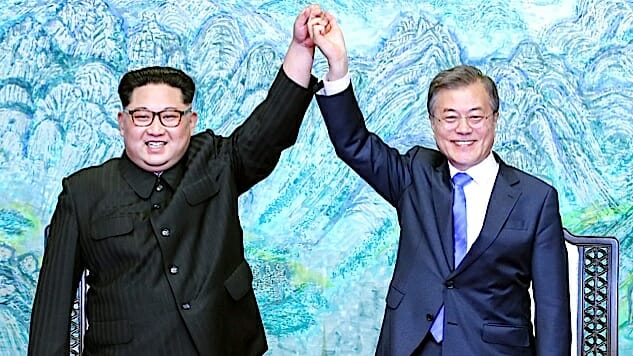Why The End of the Korean War Is Bad News for the United States
Photo courtesy of Getty
Last week South Korean President Moon Jae-in and North Korean “Supreme Leader” Kim Jong Un met at the border between the two countries to sign a historic agreement that provides a framework for cooperation and denuclearization which will, per terms in the agreement, lead eventually to the end of the decades-long Korean War. Sensational as this headline is, it also presents several obstacles and uncertainties, a major one being the wishes and interests of the United States, which, in spite of prevailing thought, might actually impede the peace process.
To be sure, over the last three months peace negotiations between the North and South have delivered a number of firsts for the two nations, still technically at war. They reopened direct bilateral talks and fielded a joint Olympic team. Kim has made persistent diplomatic overtures to other countries with stakes in the region, including a trip to meet Chinese President Xi Jinping and a covert meeting with Mike Pompeo, soon to be our new Secretary of State. He’s got a meeting ahead with Donald Trump. The North Korean leader has also offered to have international observers come watch his government dismantle a major nuclear test facility.
A real and lasting peace on the Korean Peninsula would be a remarkable achievement, and perhaps the one truly good thing to happen to the U.S. on Trump’s watch, but it’s far from certain. First, it’s not clear that Trump can even handle negotiations. His ego is a massive liability, and Kim is all too happy to see Trump lay claim to nonexistent victories. Negotiations haven’t begun and he’s already let his ego get ahead of himself in two tweets. This first one simply isn’t true: North Korea hasn’t technically “agreed” to anything, and Trump misunderstands what denuclearization means to them.
And this one suggests Trump’s ego will blow this deal just like he’s blown other deals.
Kim’s plan is obvious: Trump, with the figment of the Nobel Prize and another vanquishing of Obama foremost in his mind, is almost guaranteed to over-commit too early and too loudly (and probably inaccurately) to a peace deal. This will, of course, weaken Trump’s ability to make new demands when Kim shifts his position down the line, and it will give North Korea (and China) more leverage. At minimum, then, we can expect Kim to withdraw from Trump concessions on sanctions while he perhaps makes superficial changes to his nuclear program. He’s not giving up his weapons, and it’s quite possible the whole deal goes bust. At most, Kim will strike a multilateral peace deal that flatters Trump short-term and more or less hands East Asia over to China in the long run. Trump will be fine with this, because he only sees the short term and he only cares about himself. Kim Jong Un would happily endure Trump’s ignorant boasts for a few months, knowing long-term the U.S. will be pushed out of the region.
So it’s not at all clear yet whether an end to the Korean War will be good for America in the long run. Peace on the peninsula will be without doubt a remarkable achievement, but peace doesn’t have to go our way, and lots of things can go wrong even if North Korea begins dialing back its nuclear capability. The U.S. lacks the necessary regional diplomatic strength, ability, and legitimacy to broker and enforce an agreement on our terms, and China will likely step in. Both China and the United States, participants in the war, must sign any formal treaty to end the war, and Russia and Japan also hold major stakes in the future of the Korean Peninsula.
To understand how the end of the Korean War might also mean the end of American dominance in Asia, here’s a quick look at what the region wants out of a deal, country by country. Trump’s problem is he won’t care about what other countries care about: As long as he gets his headlines, the rest of the deal doesn’t matter. But the end of the war isn’t written in the headline. It’s in the fine print.
What North Korea Wants
1. Peace. Yes, peace. Despite the way we frame North Korea as a warmongering wild card, they don’t actually want
war. That would be mass suicide. Kim wants—for a number of reasons, including not getting assassinated or overthrown in a coup—to make his country more prosperous and open up to international markets. He’s promised this to his people since taking control of the country in 2012, and the best way forward is not through war, but through creating a stable and secure diplomatic and economic framework.
2. Denuclearization. All countries want denuclearization of the Korean Peninsula, but this terms means different things to different countries. The U.S., of course, wants North Korea to give up its nuclear weapons immediately. But to North Korea, denuclearization means the entire peninsula: It will give up its nukes (so it says) only if the U.S. also gets its nukes out of the region. Donald Trump showed his ignorance of this basic demand in a recent tweet that claimed, falsely, that North Korea agreed to denuclearization. But they haven’t, because what we’ve seen so far, including the agreement the two Koreas just signed, haven’t defined what that word means. My bet is North Korea will use this disagreement as an excuse to keep its nuclear weapons: But the U.S. won’t give up theirs!?
-

-

-

-

-

-

-

-

-

-

-

-

-

-

-

-

-

-

-

-

-

-

-

-

-

-

-

-

-

-

-

-

-

-

-

-

-

-

-

-








































